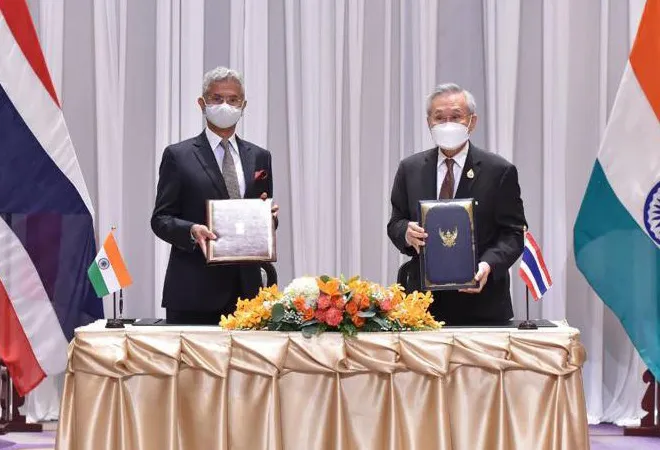-
CENTRES
Progammes & Centres
Location
While celebrating the 75th anniversary of the establishment of diplomatic relations between India and Thailand, new bilateral areas to further expand cooperation were explored.

On the 75th anniversary of the diplomatic relations between India and Thailand, Dr S Jaishankar, the Foreign Minister of India, attended and co-chaired the ninth India-Thailand Joint Commission Meeting (JCM) in Bangkok from 16–18 August 2022 with Mr Don Pramudwinai, his Thai counterpart and Deputy Prime Minister. Coincidentally India also celebrates its 75th year of independence this year and is thus keen to give its bilateral relations a new boost.
The three-day visit signalled the strengthening of relations as the focus was on the advancement of bilateral relations in the post-pandemic period. Various areas were highlighted such as trade, tourism, joint exercises, defence mechanisms, physical connectivity, ICT, cyber security, and geopolitical aspirations in terms of free, fair, and open Indo-Pacific and neighbourhood issues.
The visit followed the signing of two Memorandums of Understanding (MoUs). This included one MoU on health and medical research cooperation between the Indian Council of Medical Research (ICMR) in India and the Department of Medical Sciences (DMS) in Thailand. The second MoU cemented the alliance of broadcasting between Prasar Bharati and the Thai Public Broadcasting Service.
Dr S Jaishankar also paid a visit to Thai Prime Minister Mr Prayut Chan-o-cha and had a productive discussion on the further expansion of bilateral and multilateral cooperation and other important issues pertaining to the region and the world.
The two foreign ministers also jointly inaugurated the newly constructed Indian embassy residence and residential complex as a positive gesture toward cementing relations. Dr S Jaishankar also paid a visit to Thai Prime Minister Mr Prayut Chan-o-cha and had a productive discussion on the further expansion of bilateral and multilateral cooperation and other important issues pertaining to the region and the world.
Thailand is strategically an important player for India, both in the bilateral and regional spheres. According to the ‘Act East’ policy, Thailand, like Myanmar, is a gateway to South East Asia. Likewise, according to ‘Act West,’ India is Thailand's opening to South Asia. Both nations are prime members of several multilateral forums, for instance, BIMSTEC, East Asia Summit, IORA, and Asia Cooperation dialogue, MGC, and they also cooperate closely in ASEAN meetings.
It has also been observed that trade between New Delhi and Bangkok has picked up in recent times due to reduced tariff rates. During the Northeast festival held in the last week of July 2022 in Bangkok, the Union Minister of State for External Affairs, Mr Rajkumar Ranjan Singh stated proudly that “the trade between nations reached an all-time high of around US$15 billion in 2021–22 as the domestic market remains attractive for Thai investors”.
Exquisite Northeast Indian cuisine, especially pork dishes became popular during the festival and the demand for it among Thai people opens up prospects for the supply of meat, along with the opening of food chains for the Thai audience.
While there are commercial houses successfully operating in both nations, there is still room to advance business opportunities. The Northeast Festival held in this regard, in addition to displaying the traditional links between India's Northeast and Thailand, opens the channel for lucrative business prospects for the Northeast Indian business community that is still discovering its footing within the region. Exquisite Northeast Indian cuisine, especially pork dishes became popular during the festival and the demand for it among Thai people opens up prospects for the supply of meat, along with the opening of food chains for the Thai audience. Moreover, the advent of ‘Aatmanirbhar Bharat’ is vital in this regard since it opens the prospects for investment and broadens the scope for Indian products to be traded by Thailand to the rest of the world, especially from the Northeast, for instance, its tea products, agro-horticultural products, bamboo, handicrafts, etc.
In terms of security, the defence and security aspects are also developing with joint maritime patrolling by the navies of both countries, joint military drills, and training.
Indian diaspora has been an integral part of the Thai community for more than 150 years. The community serves as a significant link between both nations and contributes significantly to the GDP of Thailand. Tapping this potential, Dr Jaishankar, on the first day of his visit, interacted with the Indian community. He also highlighted the initiatives undertaken by the Government of India aimed at facilitating the Indian diaspora. He showed his appreciation for the help extended by the community during India’s second phase of COVID by supplying a substantial number of medical equipment.
Tourism is one of the key sectors of cooperation for strengthening people-to-people ties. It was highlighted as the foreign minister visited the Buddhist temples and tweeted about the similarities in the culture and civilisation between the two countries. Both governments have tried to tap into the Buddhist Circuit (which includes the most important pilgrimage destinations for Buddhist tourists in India and Nepal) since 2016. Millions of Thai Buddhists visit Lumbini, Bodh Gaya, Sarnath, and Kushinagar in India for their religious trips. To make this engagement seamless, the Indian government facilitated double-entry e-tourist visas for Thai citizens. It was also hoped that the Thai companies will invest in the development of the Buddhist Circuit and construct a few luxury hotels that will cater to a wider audience. While COVID-19 had affected the initiation of this process, the reopening of air channels has hoped to re-establish this initiative. The air travel bubble scheme that has been endorsed by the Thai PM to encourage Indians to visit Thailand if regular flights remain suspended has been effective. From January to May 2022, the nation received 100,884 Indian tourists, the highest number of foreign arrivals in 2022. Thus, utilising this opportunity remains vital.
Millions of Thai Buddhists visit Lumbini, Bodh Gaya, Sarnath, and Kushinagar in India for their religious trips. To make this engagement seamless, the Indian government facilitated double-entry e-tourist visas for Thai citizens.
In terms of connectivity projects, Thailand has been developing the Ranong port to increase trade with India’s Chennai and Kolkata ports. The progress on the trilateral highway that forms a crucial bridge between India and Thailand was again addressed and as stated by the ministers, is on track. The highway, which will run from Moreh in Manipur to Mae Sot in Thailand will be extended to facilitate Cambodia, Laos, and Vietnam. It thus hopes to allow access to markets across the ASEAN region and boost people-to-people ties.
New Delhi is building two key stretches of the 1,360-km trilateral highway in Myanmar, however, work on a few sections and the upgrade of nearly 70 bridges has been delayed on account of several issues such as lack of funds, technology, or qualified workers. After the coup in Myanmar, the work on several parts that are passing via the Chin State in Myanmar is slow due to security concerns stemming from conflicts and movements in the region. Thus, the speedy completion of this project seems improbable.
The political instability since the February 2021 coup in Myanmar and the rising conflicts and displacements have affected both New Delhi and Bangkok. By June 2022, both nations have received more than 40,000 displaced people and this trend is expected to escalate. Coupled with this, Bangkok has been facing heavy damages near its border areas that shares boundary with the Kayah and Karen states, as the airstrikes from Myanmar Junta continue to disrupt the area. Drug and human trafficking are also exacerbating. Thus, addressing this issue remains important for them. Both the nations are not signatories to the 1951 Refugee Convention and thus are unable to provide the displaced people with the required resources. A peaceful surrounding remains essential for the development and growth of the region. However, as neighbours, both have diplomatic obligations and security concerns; thus, dialogue has remained a suitable and constructive approach amidst the crisis. Whether it opens the doorway for a proper resolution of the situation is yet to be seen.
Coupled with this, Bangkok has been facing heavy damages near its border areas that shares boundary with the Kayah and Karen states, as the airstrikes from Myanmar Junta continue to disrupt the area.
If another common neighbour China is considered, it was made clear by the Indian foreign minister at Chulalongkorn University that the relations at the moment are at a difficult juncture due to the border standoff, nevertheless, it is in the interest of both the nations to come together but much will depend on China’s intent and actions.
Thailand’s close engagement with China at present is mainly driven by the economic factor as the latter is Thailand’s largest trade partner. China offers a huge market in terms of employment, business, and investment. . However, bilateral relations have been facing minor setbacks due to the slow development of the high-speed railway, the struggling submarine deal, and tourism. While both nations have successfully conducted the joint air exercise, and have restarted work on rail connectivity, Thailand continues to strengthen its engagements with other players such as the United States, Japan, and India to balance its stakes. In this respect, the growing footprints of India will remain crucial. Thus, swift completion of connectivity projects will hold the key to bolstering trade, tourism, and economic development.
As the 75th-anniversary celebrations of diplomatic relations continue, a lot of initiatives are yet to be tapped in terms of tourism, trade and commerce, and security concerns. While some of them have been addressed, concrete actions and plans are hoped to be designed and implemented in the near future.
The views expressed above belong to the author(s). ORF research and analyses now available on Telegram! Click here to access our curated content — blogs, longforms and interviews.

Sreeparna Banerjee is an Associate Fellow in the Strategic Studies Programme. Her work focuses on the geopolitical and strategic affairs concerning two Southeast Asian countries, namely ...
Read More +